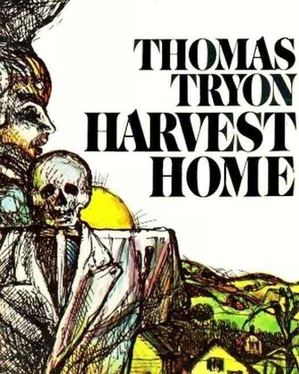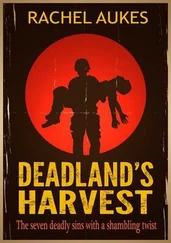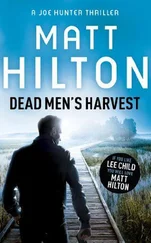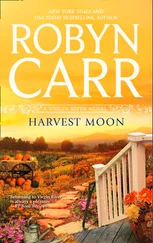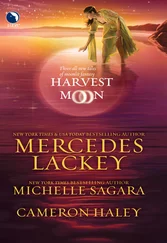But thinner. And dark smudges under the eyes; a brittleness to her posture betraying the fatigue that caused her extra effort in standing straight.
“Aren’t you eating?”
“Certainly.” She was snitching bits from the pans on the stove while she continued working. She found a paring knife in a drawer, pulled out the chopping board, and began chopping chives. She made an exasperated sound as she stopped and drew her thumb over the edge of the knife blade.
“Honestly, I paid Jack Stump thirty-five cents for this knife, and I don’t think it would cut warm butter.” She laid it aside and finished the job with another. “I swear he could sell ice to an Eskimo.” Jack Stump was an itinerant door-to-door peddler who regularly came bouncing his cart up to the kitchen door, trying to soft-soap Beth into buying the latest cooking gadget or housewife’s convenience.
“Haven’t seen Jack in a while,” I remarked.
“I know . Hasn’t been around in days. Thank God for small favors. I never heard a man talk so much.”
Movement upstairs: Kate was awake. Beth heard the sounds, too. She looked at the ceiling, glanced at me, then returned her attention to the chives.
“More coffee, darling?”
“Um-hmm.” A woman in Ohio had drowned her baby in a bathtub. Someone had done the same thing the day before. I looked at the date on the newspaper. “This is yesterday’s!”
“Paper didn’t come yet this morning.”
“Didn’t?”
“No. And Worthy’s usually Johnny-on-the-spot. You don’t suppose he’s sick?”
“I saw him in the drugstore yesterday.”
Beth brought a cloth and napkins from a drawer, the checked ones she had found when we were in Paris. I took a cinnamon bun, my cup and saucer, yesterday’s paper, and went through the open doorway into the bacchante room. From the kitchen I could hear pleasant domestic sounds: the slam of the refrigerator door, running water, the garbage disposal, Beth humming along with the radio. I got a pencil and began the crossword puzzle. Presently she came in and leaned over the back of the sofa to raise the window behind me. “What a lovely day.” She straightened the things on the piecrust table, and pulled a few leaves from the flower arrangement on the sideboard. “It’s such a nice room, isn’t it? Such a nice house. Aren’t we lucky Tamar Penrose decided to sell!” She kissed the top of my head. Remembering what the place had looked like when we moved in, I inwardly winced and thought back over the endless weeks of renovation: the torn-up rooms, the paint smells, the insidious silt of plaster dust on everything, our tired bodies dropping into bed at night. Now the work was almost done. New kitchen, new bathrooms, new hardware, new screens and awnings. The insulation men were finished, the floor men, the electricians, the heating men. The house was painted inside and out, the dining room papered; Lawson Colby’s furniture, a collection of good antiques, had been brought from storage and arranged in the rooms. Among the remaining jobs were the terrace wall and the skylight in the studio. But our mainstay, Bill Johnson, was leaving next week to spend the autumn and winter in Las Vegas, and we would have to look elsewhere for a handyman.
“I think she’s got designs on you.”
“Huh? Who?”
“Tamar Pen rose. I see her making goo-goo eyes at you when we go in the post office.” Tamar Penrose had designs on me? I recalled the way she would manage to stretch across the post-office counter, or sling her hips while lounging at the postal scales. Still, designs? We’d hardly exchanged two words.
“Half the village is named Penrose, from what I can see,” I said.
“It’s awful the way they’ve inbred. They’re all direct descendants of the original family. ‘Once or twice removed,’ cousins marrying cousins-that sort of thing. Some of them are a little-you know.” She tapped her temple. “Like Amys.”
“Amos who?”
“Not ‘A-m-o-s’,’’ she spelled “‘A-m-y-s.’ He’s that marvelous old curmudgeon who sweeps the streets and rings the church bell. The one Kate calls ‘vinegar puss.’ And the Widow’s husband was a Penrose on his mother’s side.”
“Was he-?” I tapped my temple.
“Oh, I don’t think so. How old do you think she is?”
“Who?” I was trying to think of a four-letter word for “decree.”
“The Widow.”
“Dunno.” I wrote in “fiat.”
“I suppose she could be anywhere from sixty to ninety. Maggie Dodd says it’s the best-kept secret in the village.” She carried my empty cup into the kitchen.
“How long a widow?” I said through the doorway.
“Ages. Maggie says it was quite a love match. It’s the honey that does it, I guess.”
“Makes love matches?”
“No, dopey. It’s the Widow’s honey that keeps all those old farmers young. Mr. Deming must be eighty, and he looks-”
“Seventy.” Ewan Deming was chief among the village elders.
“The same with Amys. Half the farmers in the village are over sixty and they still work a whole day.”
“How do you account for it?”
“The Widow calls the body the human house. She says to stay healthy, watch the cows. Cows have common sense and know what to eat. Like lots of people don’t,” Beth continued from the kitchen.
I heard the sound of Kate’s feet on the stairs, then glimpsed her as she passed through the front hall beyond the dining room; in a moment she was with her mother.
“Hi.”
“Morning, darling. Sleep well?”
“Nope.”
“Don’t forget your vitamins, dear. All set for the fair?”
“Guess so. Bet it’ll be corny.”
It was going to be one of her smarty days. “C’mon,” I called, “it’ll be fun.”
Carrying her orange juice, Kate came in and kissed me. “Hi.”
“Hi, sweetheart.” Her hand trembled as she drank from her glass, and I could tell she’d had another bad night.
“It’s not every day you get to go to a real country fair.”
“Cut the commercial, Daddy.” She stared out the window, popping the vitamins between gulps. Her sleepy face looked doleful and lethargic. Kate with her unmanageable hair, her urchin’s face, her sandpapery voice-poor knobby, angry Kate. Her eyes were red and puffy, her face pale.
“They sure got a lot of yokels around here.”
“Yokels?”
“And some of ‘em are crazy.”
“Who’s crazy? I haven’t seen anyone crazy.”
“Missy Penrose is crazy.”
“Darling, don’t say that,” Beth said from the kitchen. “Missy’s not crazy; she’s a little unusual, that’s all.”
“And she’s a bastard.”
Worse than smarty; mean. When these moods came upon her, a result of lost sleep, it was difficult to know how to handle her. “Lots of children are illegitimate, but it doesn’t mean they’re any less or any worse than we are. People can’t help the circumstances of their birth.”
“She’s still crazy. She hardly ever talks, she mumbles, and when she does talk she says nutty things. And she goes into the woods to trade looks with the boys. And her mother’s a sex fiend.”
Through the doorway, I caught Beth’s eye as it flashed a humorous look at me behind Kate’s back: Has designs on you . “Come and have your Granola, dear.”
“Not hungry.”
“Kate, you’ve got to eat something. I’ve got scrambled eggs and sausage. Honestly, with people-”
“-starving in India; I know.” Kate ambled into the kitchen and I heard a chair scrape the floor as she sat at the table. “What are we having for lunch?”
“Darling, try to think about your breakfast first, huh? We’re having vichyssoise with chopped chives, chicken breasts stuffed with crab-”
Читать дальше
